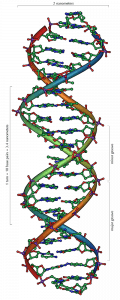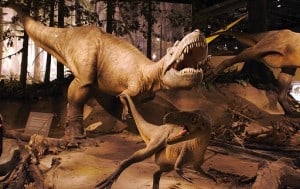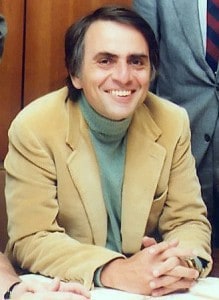Human beings are questioning animals. It is in our genes. And nowhere is the desire for answers greater than when it comes to the question of our origins. But how we arrive at these answers really matters – as does how we arrive at knowledge in general. There are very real dangers when we ignore reality and simply forge ahead with claims and beliefs that are not supported by scientifically-proven evidence. At a personal level, it results in people getting caught up in all manner of scams and delusions like the effectiveness of homeopathic medicine and astrology. At a societal level, ignoring reality has done great damage to the teaching of evolution. It has also resulted in near-complete inaction on reducing greenhouse gas emissions, thanks to a very effective campaign to distort and lie about climate science and to mislead the public.
Believing things on insufficient evidence – e.g., that the creation story of the Bible is literally true – is still hindering students from knowing the real story of how we, as human beings, came to be. When fully understood and felt emotionally, the power and the wonder of evolution should inspire all of us profoundly. What this story says is that every bacterium, plant, fungus and animal that ever existed— and, yes, every person — owes its existence to a completely unbroken stream of DNA stemming from the earliest self-replicating organism through to every creature living today. But yet, many teachers still feel uncomfortable teaching this foundational part of science because of push-back from creationist students and parents – something I experienced as a teacher. I would argue that even at the high school level, we do a poor job of teaching evolution. Just ask your own kids how much they know about it.
I am addressing this subject partly in response to Jim Mason’s recent Examiner column “Answers to new story found in the old story” (January 13, 2013) in which he makes the extraordinary claim that DNA evidence points to dinosaurs roaming the planet 4500 years ago, and that they died in “the global flood that formed the fossils.” As outrageous as these claims may be, they don’t stem from any lack of education on Mason’s part. He has a BSc in engineering physics and a PhD in experimental nuclear physics. The reason for these assertions lies in the fact that Mason is a biblical creationist and speaker for Creation Ministries International. According to the biography that appears on the creation.com website, Jim Mason believes that “the Bible is believable from first verse to last.”
Claims such as these clearly demonstrate how creationists engage in belief without evidence. This is not because they are bad people, lack intelligence or are not being exposed to the scientific arguments, but rather because of a belief system that prevents acceptance of reality. The religious beliefs that they have bought into – or, as is usually the case, instilled with since childhood – have constructed a brain that is unable to deal with science honestly. Why? Because science disproves what they believe, and belief is their starting point, not evidence. If, for example, evolution was untrue – what Mason is implying – you can be sure that some ambitious scientist would have exposed the faulty science by now and have become as famous as Charles Darwin in the process. Mason knows this.
If we lower our standard of evidence to the point that it is acceptable to voice claims about the literal truth of the Bible with all its miracles – just because such beliefs may be comforting and appear on the surface to be morally superior – then we have no good reason to reject any claims of miraculous events. These would include Mohammed being carried to heaven on a winged horse or, according to some Muslims, that martyrs will be greeted by 72 virgins upon their death. Is this the kind of thinking we want to condone and leave unchallenged in an age of nuclear weapons? By respecting the claims of biblical literalists, we give cover and respectability to all kinds of religious beliefs, some of which are incredibly damaging. Just look at what homosexuals are facing in Russia as a result of pressure on the government from the Russian Orthodox Church.
One reason why creationists reject the theory of evolution is because it doesn’t elevate humans above other forms of life. In other words, it doesn’t make us feel special. But, should we not feel special as humans that we alone have a brain that has evolved to the point of being able to unravel, understand and appreciate the true story of how we came to be? No other organism can claim that. And isn’t that an accomplishment hugely more impressive and awe-inspiring than believing in miracles? The truth is indeed more “magical” than is any myth.
What is science?
Unfortunately, the word science is loaded with preconceptions, many of them negative or at least stereotypical. White lab coats, bubbling beakers and emotionless researchers come to mind. We therefore need to be reminded of what science really is, namely the best way humans have come up with yet to acquire knowledge and to understand the world. Scientists are motivated by the excitement of discovering or explaining something new, knowing all the while that other scientists will be closely scrutinizing their work. They are also motivated by debunking old explanations if they can be proved false. So far, both evolution and man-made climate change have withstood every argument that has been presented to disprove them. And, by the way, Jim Mason, too, denies that humans are causing climate change (Peterborough Examiner, Nov. 6, 2013).
The idea that science has nothing to offer our spiritual lives is also untrue. On the contrary, the revelations of science should add immensely to our capacity to feel awe and wonder – all the more so because no leap of faith is required. Part of the problem is that science is usually taught as a purely practical subject. What we need is much more of a “Carl Sagan” approach, especially for younger children. Sagan was an American astronomer, author and science communicator, known especially for his award-winning 1980 television series “Cosmos”, which can be still be found on YouTube. I’m sure that Sagan would say that the greatest value in understanding evolution, for example, is as a source of wonder. It doesn’t matter if you can’t quite grasp all of the genetics involved. There is an analogy here with music. You can be a lover of music and appreciate all of its emotional depth without being a musician or having any understanding of music theory. We need to teach students in such a way that they feel the same awe, wonder and emotion in science that we all recognize in music.
And, yes, there are things that science cannot yet fully answer, but that doesn’t mean that the default explanation is “God did it”. Often, the only honest answer is: “This is something we don’t yet understand, but we’re working on it.” How life got started in the first place is one such question. Interestingly enough, according to a recent article in the Globe and Mail (January 25), a Canadian Nobel Prize-winning biochemist at Harvard University, Dr. Jack Szostak, believes that the mystery of how life began will be answered during the course of his remaining scientific career. He is 61 now.
Living on a planet of seven billion people with limited resources and civilization-ending weapons, we really do need to care whether or not our beliefs are true and not simply comforting or tailored to fit our ideology. We need to develop a habit of mind in which we follow the evidence to where it leads, instead of leading the evidence to where we want it to go. We need to be willing to change our mind when the evidence warrants it. In many situations, we also need to be able to say “I don’t know”.
We also need to see the wonder in what we do know. As Elizabeth Johnson wrote, we do know this: “Out of the Big Bang, the stars; out of the stardust, the Earth; out of the Earth, single-celled living creatures; out of evolutionary life and death of these creatures, human beings with a consciousness and freedom.” Seen in this way, science, along with evidence-based thinking, can help us feel connected to the natural world and hopefully help us strive to be far better stewards. A literal belief in the Bible, however, sets humans apart from nature and is one reason why we are seeing such devastating environmental degradation.


